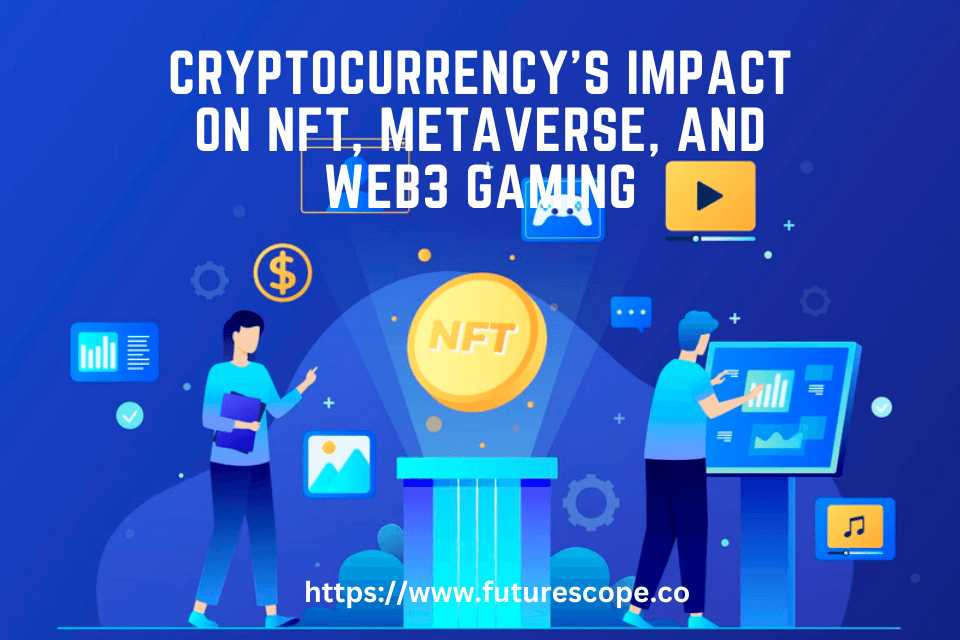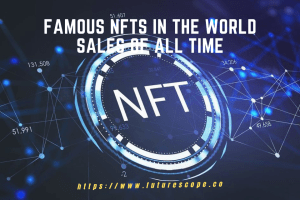What We Have Covered in This Article
Last Updated on March 30, 2023 by Editor Futurescope
The world of gaming has come a long way since the days of Pong and Space Invaders. Today’s gamers are immersed in a virtual world that is constantly evolving and expanding. The rise of NFTs, the Metaverse, and Web3 gaming has opened up new opportunities for players and developers alike. With the integration of cryptocurrency, these technologies are set to transform the gaming industry in ways that were once thought impossible.
Cryptocurrency has already made a significant impact on the gaming industry. In-game purchases, microtransactions, and loot boxes have become commonplace in many games, and the use of cryptocurrency has made these transactions faster, more secure, and more accessible. With the rise of NFTs, players can now own unique and valuable items that are stored on the blockchain, giving them true ownership over their in-game assets.
The Metaverse is another technology that is set to revolutionize the gaming industry. The Metaverse is a virtual world that is created by the convergence of multiple virtual and augmented reality environments. It is a place where players can interact with each other and with virtual objects in a way that is similar to the real world. With the integration of cryptocurrency, the Metaverse has the potential to become a fully functioning economy, where players can earn and spend cryptocurrency in the same way that they do in the real world.
What are NFTs?
Non-fungible tokens (NFTs) are digital assets that are unique and indivisible. Unlike cryptocurrencies, which are fungible and interchangeable, NFTs are one-of-a-kind and cannot be replicated. Each NFT is stored on a blockchain, which ensures that it is authentic and cannot be duplicated or tampered with.
NFTs can represent a variety of digital assets, including artwork, music, videos, and even virtual real estate in the metaverse. They are often used in the gaming industry to represent in-game items and characters, such as weapons, armor, and avatars.
One of the key benefits of NFTs is that they enable creators to monetize their digital creations. By selling NFTs, artists, musicians, and other creators can earn revenue from their work and retain ownership of their intellectual property. NFTs also provide a way for collectors to invest in and own unique digital assets.
While NFTs have become increasingly popular in recent years, they are still a relatively new technology. As with any emerging technology, there are concerns about fraud, security, and regulation. However, many experts believe that NFTs have the potential to revolutionize the way we think about digital ownership and the value of digital assets.
Metaverse and Web3 Gaming
The Metaverse is a virtual world where people can interact with each other and digital objects in a three-dimensional space. It is a concept that has been around for decades, but the recent development of blockchain technology has brought it closer to reality. Web3 gaming is a new type of gaming that incorporates blockchain technology, NFTs, and cryptocurrency into the game mechanics.
One of the biggest advantages of the Metaverse is that it allows for true ownership of digital assets. In traditional games, players can earn items and achievements, but they do not truly own them. In the Metaverse, players can own digital assets that have real value. This is made possible through the use of NFTs, which are unique digital assets that are stored on the blockchain.
Web3 gaming takes advantage of this ownership model by allowing players to buy, sell, and trade NFTs within the game environment. This creates a new type of economy within the game, where players can earn cryptocurrency by selling their digital assets. This has the potential to create a new type of gaming experience where players can earn a living by playing games.
Another advantage of Web3 gaming is that it allows for true decentralization. In traditional games, the game developer has complete control over the game environment. They can change the rules, shut down the servers, and ban players at will. In Web3 gaming, the game environment is controlled by the blockchain, which is decentralized and cannot be controlled by any single entity. This gives players more freedom and control over the game environment.
Overall, the Metaverse and Web3 gaming have the potential to revolutionize the gaming industry. They offer a new type of gaming experience where players can truly own their digital assets and earn cryptocurrency by playing games. They also offer more freedom and control to players, which is something that traditional games cannot provide.
Cryptocurrency in NFTs
NFTs or Non-Fungible Tokens are unique digital assets that use blockchain technology to verify ownership and authenticity. Cryptocurrencies are the primary means of buying and selling NFTs. Most NFT transactions occur on the Ethereum blockchain, where users can buy and sell NFTs using Ether (ETH), the native cryptocurrency of the Ethereum blockchain.
When a user buys an NFT, the transaction is recorded on the blockchain, which verifies the ownership and authenticity of the NFT. Cryptocurrencies, like ETH, are used to pay for NFTs because they are easily divisible and can be used for microtransactions. This makes it easier for users to buy and sell NFTs without incurring high transaction fees.
Cryptocurrency has also played a significant role in the rise of NFT collections and drops. NFT collections are groups of NFTs that are released together, often with a theme or design. NFT drops are limited-time sales of NFTs, where users can buy a specific NFT at a set price. Cryptocurrencies are the primary means of paying for these NFT collections and drops.
Finally, cryptocurrency is also used as a reward mechanism in NFT-based games. Players can earn cryptocurrency by playing games, completing quests, or winning battles. This creates an incentive for players to engage with the game and build their collection of NFTs.
Cryptocurrency in Metaverse and Web3 Gaming
The use of cryptocurrency in metaverse and web3 gaming is becoming increasingly popular. Cryptocurrencies such as Bitcoin and Ethereum are being used to power transactions within the metaverse, allowing players to buy and sell virtual assets such as NFTs and in-game items with ease. This has created a new economy within the metaverse, where players can earn cryptocurrency by selling their virtual assets or by completing in-game tasks.
One of the main advantages of using cryptocurrency in metaverse and web3 gaming is the increased security it provides. Transactions are secured by the blockchain, which makes them virtually impossible to hack or manipulate. This ensures that players can buy and sell virtual assets with confidence, without the risk of fraud or theft.
In addition, the use of cryptocurrency in metaverse and web3 gaming has also helped to increase the transparency of transactions. Since all transactions are recorded on the blockchain, players can easily track the history of any virtual asset they buy or sell. This helps to prevent fraud and ensures that all transactions are conducted fairly and transparently.
Finally, the use of cryptocurrency in metaverse and web3 gaming has also helped to create a new level of financial freedom for players. Since players can earn cryptocurrency by completing in-game tasks or by selling virtual assets, they can now earn a living by playing games. This has created new opportunities for players, especially in regions where traditional job opportunities may be limited.
Challenges and Opportunities
The metaverse, NFTs, and cryptocurrency are all relatively new concepts that have yet to be fully realized. As such, there are challenges and opportunities that come with these technologies.
Challenges:
- Environmental Concerns: Cryptocurrency mining and NFT creation require significant amounts of energy, leading to concerns about their impact on the environment.
- Technical Issues: The metaverse requires high-speed internet connections and powerful hardware, making it inaccessible to those who lack the resources to access it.
- Regulatory Uncertainty: The regulatory landscape surrounding cryptocurrency and NFTs is constantly evolving, leading to uncertainty for developers and users alike.
- Security: Cryptocurrency wallets and NFT marketplaces are vulnerable to hacking and other security breaches, leading to potential financial losses for users.
Opportunities:
- New Business Models: The metaverse and NFTs offer new ways for creators and developers to monetize their work, such as through virtual real estate and unique digital assets.
- Increased Access: The metaverse has the potential to increase access to education, healthcare, and other services, particularly for those who lack physical access to them.
- Decentralization: Cryptocurrency and blockchain technology offer the potential for a decentralized financial system that is accessible to anyone with an internet connection.
- Community Building: The metaverse and NFTs offer new ways for people to connect and build communities around shared interests and values.
Overall, the challenges and opportunities presented by the metaverse, NFTs, and cryptocurrency are complex and multifaceted. As these technologies continue to evolve, it will be important to address the challenges while maximizing the opportunities they offer.
Conclusion
As we have seen, the relationship between cryptocurrency, NFTs, and the metaverse is complex and intertwined. Cryptocurrency provides the financial infrastructure that powers the metaverse, while NFTs enable the ownership and transfer of unique digital assets within it. Web3 gaming, on the other hand, is an emerging trend that leverages the power of the metaverse and NFTs to create immersive and interactive gaming experiences.
Together, these technologies are transforming the way we interact with digital content and each other. They are opening up new possibilities for creators, developers, and investors alike, and creating a more decentralized and democratized digital economy.
However, it is important to note that these technologies are still in their early stages, and there are many challenges and obstacles that need to be overcome. Issues such as scalability, interoperability, and regulatory compliance will need to be addressed in order for these technologies to reach their full potential.
Despite these challenges, the future of cryptocurrency, NFTs, and the metaverse looks bright. As more and more people embrace these technologies, we can expect to see a new wave of innovation and creativity that will drive the digital economy forward.









